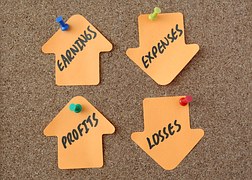Capital revenue expenditure in accounts
.What is capital expenditure?

The purchase of capital items like machinery, land & buildings, furniture, fixture, and motor vehicles to use in the business either in the long run or for one or two years. The expenses incurred in this way are called capital expenses.
Capital revenue expenditure in accounts
Importance of capital expenditure.
It is better to have a capital expenditure budget as it protects you from losing financial benefits over the years. Capital expenses on an asset helping to grow the company’s profit over several years, which is longer than the current tax year. It differs from operational costs paid for acquisitions during the current year for use in the current tax year. An example of a functional expense is buying a printer, which is a capital expense. Always capital expenditure is much higher than the other costs, mainly because it is a long-term asset.
The sole proprietor of the business needs to make the budget for capital expenditure as it has long-term effects on the company’s financial side.
Revenue Expenditure.
An expense incurs in the accounting period to support the business’s current operations.
Revenue expenditure is the sum of the expense that the business incurs in producing goods and services, which helps the company’s revenue generation in an accounting period.
The following are examples of revenue expenditure
Rent
Rates
Electricity
Salaries
Manufacturing expenses
Transport
Printing
Traveling
More:
An item of revenue expenditure is the cost of payments incurred to run the business. It is the cash spent on generating sales or maintaining a revenue-generating asset. For example, a piece of machinery is an asset, cash spent on purchasing that asset is a capital expenditure, and payment spent on maintaining that motor, like regular cleaning, is a revenue expenditure. Therefore, the money spent on sales generation and maintenance of assets refers to revenue expenditure.
Revenue expenditure is the expenditure incurred by the company during its ordinary business operations for which the benefit will receive in the same accounting period in which committed and shown as the expense in the company’s income statement.

How do these expenses appear in the final accounts?
Capital expenditures are charged to expense in the long term through depreciation, and the revenue expenditure is charged as expenses during that accounting period.
The accounting entries will be as follows:
Capital expenditure
Debit Assets
Credit Cash/ Payables
Revenue expenditure
Debit Revenue expenses in the income statement
Credit Cash/Payables
Revenue expenses are debited to the trading account or the profit and loss account at the end of a financial year.
Money received from the sale of a capital asset is debited to the cash account and credited to the debit of the particular which sold. The cash amount received from this type of sale is not treated as sales income or takings, and that asset’s value needs to be erased from accounting records. If the particular was subject to depreciation, the specific documents need adjustment as that individual asset is not there for a discount.
I hope the above tips are helpful for a sole trader when marinating the books for capital and revenue expenses related to the business.

